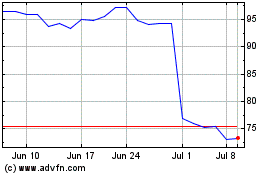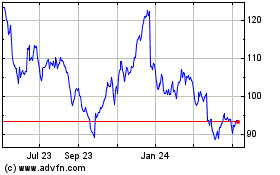Golfsmith International Files For Chapter 11 Protection
September 14 2016 - 10:50AM
Dow Jones News
Golfsmith International Inc. filed for chapter 11 bankruptcy
protection Wednesday after negotiating a restructuring plan that
calls for store closures in the U.S. and the sale of its Canadian
retail chain.
Court papers show the Austin, Texas-based specialty golf
retailer reported assets and debts each in the range of $100
million to $500 million in its chapter 11 petition, which it filed
in the U.S. Bankruptcy Court in Wilmington, Del.
The Wall Street Journal had earlier reported the company's plans
to file for chapter 11 protection as well as to seek protection
under Canada's Companies' Creditor Arrangement Act.
According to people familiar with the matter, the filings
include an agreement to sell its Canadian chain of about 50 stores,
operating under the brand Golf Town, to two of its largest
creditors. The buyers are Toronto fund manager CI Financial Corp.
and Fairfax Financial Holdings Ltd., controlled by Canadian
financier Prem Watsa.
CI Financial and Fairfax, which own about 40% of Golfsmith's
secured debt, have agreed to support Golfsmith's move to seek court
protection from its creditors in the U.S. and Canada.
The Canadian chain is healthier than its U.S. counterpart
because it has a larger market share in a less crowded golf retail
sector.
U.S. stores have suffered because of either over saturation in
certain markets or being too large in general, said a source close
to the matter.
As part of the bankruptcy filing, Golfsmith will likely close
some of these U.S. locations, as well as a small number of stores
in Canada, the person added. The company also plans to renegotiate
some of its leases with landlords, the person said.
Golfsmith has been in advanced discussions with potential
bidders for its U.S. chain of about 100 stores, but according to
one person familiar with these talks, a sale was unlikely unless
the company closed a number of its stores and trimmed its debt.
Golfsmith's planned breakup comes four years after it was
acquired by Toronto-based Golf Town for about $97 million, a deal
that was backed by the private equity arm of the Canadian pension
fund OMERS. Following the merger, Golfsmith launched an ambitious
expansion across the U.S. with large golf emporiums, some of which
featured indoor putting greens and golf simulators.
The strategy quickly unraveled as U.S. golf participation levels
declined and increased competition from big box and online
retailers eroded profit. The tough competitive environment has
prompted other sports retailers such as Nike Inc. to shift away
from golf equipment sales, while others sports retailers sought
bankruptcy protection or closed operations.
Since David Roussy took the helm as chief executive of Golfsmith
in 2015 he has focused on beefing up the company's e-commerce side
of the business and integrating it with its brick-and-mortar
stores, the person close said. Still, the fruits of this labor have
yet to be fully realized and are expected to take effect more so
over the long-term, said the person.
Goldsmith hired Jeffries LLC and Alvarez & Marsal earlier
this year to solicit potential buyers and review various
restructuring strategies. More recently it has been advised by Weil
Gotshal & Manges LLP And Goodmans LLP.
Write to Jacquie McNish at Jacquie.McNish@wsj.com and Lillian
Rizzo at Lillian.Rizzo@wsj.com
(END) Dow Jones Newswires
September 14, 2016 10:35 ET (14:35 GMT)
Copyright (c) 2016 Dow Jones & Company, Inc.
Nike (NYSE:NKE)
Historical Stock Chart
From Mar 2024 to Apr 2024

Nike (NYSE:NKE)
Historical Stock Chart
From Apr 2023 to Apr 2024
